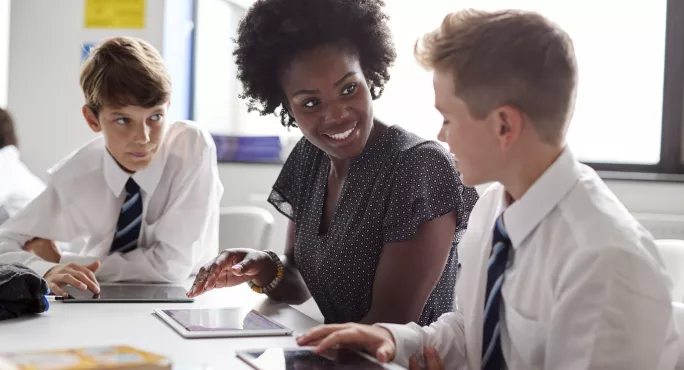- Home
- Why attachment-aware teaching matters for every child
Why attachment-aware teaching matters for every child

Teachers are becoming ever-more comfortable talking about attachment when it comes to students who have experienced trauma, but attachment-aware practice should not just be used with the most vulnerable - every child would benefit, according to Professor Peter Fonagy.
Speaking on this week’s Podagogy podcast, the head of psychology and language sciences at University College London explains that attachment is a fundamental part of successful teaching that needs more consideration (listen below).
Fonagy explains that attachment is a process every child goes through.
“Attachment is a very simple biological process,” he says. “Because of [an infant’s] dependency, we need protection. And we need to find the person who’s going to protect us. The person who’s going to protect us is usually our primary caregiver. And we get attached to that person.
Attachment theory in education
“So whenever we are anxious, whenever we feel frightened, we seek proximity to that person who’s going to comfort us, we signal our fear by crying, by making a nuisance of ourselves in one way or another.”
Quick read: Professor Barbara Oakley on why working memory is the Rosetta Stone of teaching
Quick listen: What every teacher needs to know about trauma
Want more articles like this? Join the Tes Teaching and Learning Facebook group
As the child gets older, she or he seeks out more adults to form strong attachments with. “Human beings are like lions,” explains Fonagy. “They are born to be alloparented” - and that includes teachers. In order for a child to learn, they have to trust the teacher, and to trust them they need to have a secure attachment to them.
“We know that children who have secure attachment relationships actually learn better,” Fonagy explains. “When you are in a world with a cacophony of information all around us, we can’t listen to everything. We have to have a biological way of focusing on the person who’s going to relay to us the information that’s relevant to us.
“This biological system of learning that we call ‘epistemic trust’, or the ‘trust in knowledge’, actually opens the mind up to learning from that individual in that context.”
Attachment-aware practice
This is why attachment-aware practice is so crucial for all children, according to Fonagy. Teachers need to not just support those children with obvious attachment challenges, they also need to ensure they form stable attachments with every child in a class.
How might that be done? The simplest way, says Fonagy, is to show an interest in them.
“If you recognise me, as an agent as a person, I will be more likely to learn from you,” he explains.
To do that, non-learning related conversations are key - showing an interest in what the young person thinks and feels is also important. With 30 children in a class, that might seem difficult with so much content to cram in, but whether it is through form time, extracurricular clubs or in your approach to teaching, Fonagy is certain it is a fundamental part of what teachers should be doing.
Vulnerable children
This is not to say that those who have experienced trauma and may have attachment challenges should just get the same treatment as everyone else. Fonagy says a student who has experienced trauma and has attachment issues is more likely to find forming later attachments more challenging.
“If you had an early experience where you were neglected or maltreated, as some children are, then you get very confused about who you can trust and who you can’t trust,” says Fonagy. “And then you flip flop between not trusting anybody, being in a state of a kind of epistemic hypervigilance.
“You are going around, feeling no one understands you, thinking, ‘I’m all on my own. I can’t trust anybody. I can’t listen to anybody.’ And that sets you off on the wrong foot. And that would make you a difficult child to teach because you don’t trust the knowledge that comes from the other.”
More time and more support will be needed with these pupils.
“It can be very hard for a teacher to break through and the child might need a lot of additional effort before they can develop a feeling of trust towards that person,” he explains.
What can also happen, says Fonagy, is a situation where a student forms inappropriate attachments, and begins seeking out their information not from teachers, or trustworthy contemporaries, but instead from those who do are looking to exploit them.
“We can see in gangs, and little clusters of children that get formed, where they feel so lonely that they then have to form relationships,” he says.
It just takes one
The good news is that if teachers get it right with these pupils, even those with the most difficult set of circumstances can be helped, according to Fonagy.
“One good relationship, when you have someone who’s able to make you feel that they’re interested in you, that they care about you, can actually reverse history of pretty bad things,” he says.
You can listen on the player above or via your podcast platform (including Spotify) - just search for ‘Tes - The Education Podcast’
Keep reading for just £1 per month
You've reached your limit of free articles this month. Subscribe for £1 per month for three months and get:
- Unlimited access to all Tes magazine content
- Exclusive subscriber-only stories
- Award-winning email newsletters



